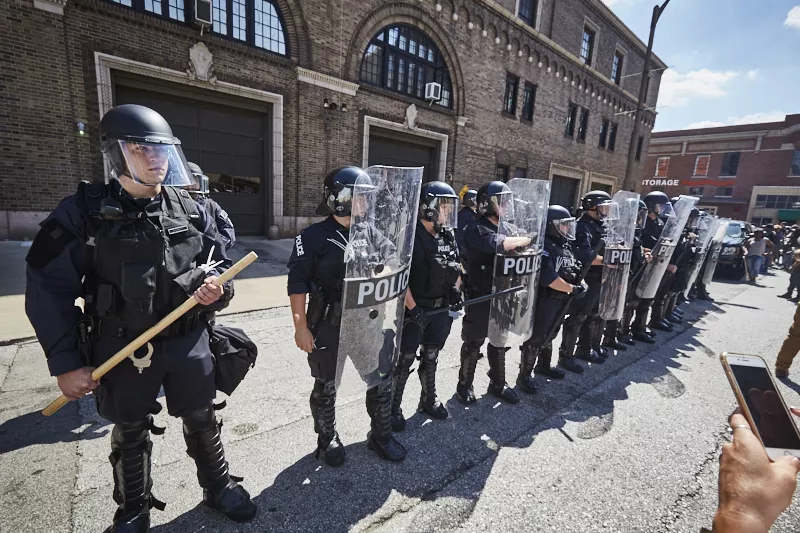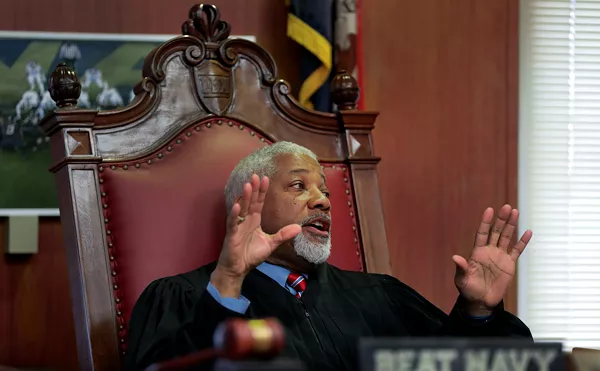
PHOTO BY THEO WELLING
St. Louis officers face off with protesters on September 15, 2017, the day a former officer was acquitted of murdering a suspect.
In the debate around Proposition P, an important consideration has been entirely ignored: Voters are being asked to do something that the St. Louis Police Officers Association (SLPOA) was unwilling to do: endorse the tax increase without first negotiating legally enforceable language about exactly how much they would receive in return.
The SLPOA withheld its endorsement until after the city had agreed to a $10,000 increase in officer compensation. Knowing that its endorsement would be key in passage of the sales tax increase, the union used its endorsement as a key part of collective bargaining agreement negotiations. This is especially critical, as the only legally enforceable part of the sales tax increase will be the monies agreed upon in the police officers’ and firefighters’ collective bargaining agreements.
But how can that be, when the police, mayor and other spokespeople are standing in community meetings and telling audiences that monies allocated would definitely go where they are advertising? Why, the mayor was quoted in this very publication as saying the public safety focus would be guaranteed, due to the amounts being “laid out in iron-clad terms in the board bill that put the resolution on the ballot.” She also promised that the estimated $4 million raised by the corollary increase in the business use tax would go towards mental health services, vacant building demolition and summer jobs programs — a supposedly “integral" part of the measure’s purpose.
Those promises are curious, however, as the previously stated position of both Krewson and the city counselor’s office is that Use Tax monies can be rerouted in annual budgets, and that the budget overrules the language in the tax’s enabling ordinance. The mayor claimed to the Post-Dispatch in May that the expenditure rates guaranteed in the Use Tax’s enabling ordinance could be ignored, since “what people voted on never said we’re going to spend $5 million per year on affordable housing.” It is worth noting that the ballot question that we will be now be voting on also fails to list the spending levels for any new Use Tax revenues — even as the city’s legal position is that this money could be redirected to any number of spending areas. The only thing that will have any legal standing to dictate spending will be the collective bargaining agreements.
So, we’re voting on a tax increase that will only guarantee funding to police and firefighter compensation, despite the claims of the “Yes on P” campaign. The community would be voting with no guarantee of long-term funding for anything else in the marketing campaign, much less substantive reforms to the city’s inhumane and expensive “arrest and incarcerate” model of policing.
Despite overwhelming evidence that the public is demanding change to our public safety system, we’re continuing to pump resources into a system that already takes up over half the city’s budget and has provided very poor results. This is the public policy version of continuing to make expensive repairs to an old car, despite the fact that you could actually save money on purchasing a new vehicle and getting rid of the “clunker.”
The “No on P” campaign’s position is that any tax and salary increases should only be approved after the city agrees to real reforms. We are saying that we want it in writing, just like the SLPOA demanded. Nothing more, nothing less.
The city can always take a sales or other tax increase to the ballot in future elections if Proposition P fails to pass. As the city’s retirement compensation package is better than our suburban neighbors, city officers would be foolish to immediately jump ship, knowing that increases in their salaries will be coming, even if delayed.
We are simply saying that we should consider alternative, less regressive, ways of funding raises and that we have real reforms enacted, before we sign over all of our leverage in the negotiations. We’re just asking for the same level of respect and consideration as the SLPOA and the officers that the union represents.
City voters have the chance to be savvy consumers of government services, and we should be aware of the economic power that comes from our votes. The ballot presents us only one option that can help us achieve both greater respect and accountability from our city’s political leaders and the police department: VOTE NO ON P!
Glenn Burleigh is a longtime progressive activist who lives in south city's Marine Villa neighborhood and volunteers with Team TIF. He’s currently active in the Audit STL campaign demanding an audit of the city’s finances, including the police department. The RFT welcomes concise essays on topics of local interest. Contact [email protected] if you've got something to say.





